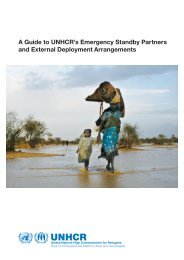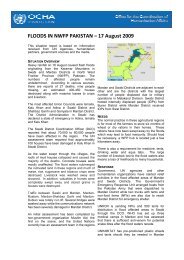Women, Girls, Boys and men - HumanitarianInfo.org
Women, Girls, Boys and men - HumanitarianInfo.org
Women, Girls, Boys and men - HumanitarianInfo.org
You also want an ePaper? Increase the reach of your titles
YUMPU automatically turns print PDFs into web optimized ePapers that Google loves.
In the aftermath of disasters, affected communities<br />
will need help to restart agricultural activities as soon<br />
as possible, in order to meet household food security<br />
needs adequately <strong>and</strong> restore resilience. Since emergencies<br />
tend to exacerbate existing vulnerabilities, the<br />
respective roles <strong>and</strong> responsibilities of wo<strong>men</strong> <strong>and</strong> <strong>men</strong><br />
<strong>and</strong> their constraints, needs <strong>and</strong> capacities need to be<br />
analysed <strong>and</strong> understood in order to ensure that effective<br />
assistance is provided. Ultimately, the objective is to assist<br />
in a quicker <strong>and</strong> more sustainable recovery, especially for<br />
the most disadvantaged <strong>and</strong> vulnerable groups.<br />
Household food security does not necessarily mean the<br />
same as food self-sufficiency, which refers to sufficient domestic<br />
production to meet the needs of the population.<br />
It refers both to the availability <strong>and</strong> stability of food, <strong>and</strong><br />
the purchasing power of the household where food is not<br />
produced. Food security also depends on food adequacy<br />
<strong>and</strong> acceptability to consumers, as well as the availability<br />
of clean water <strong>and</strong> firewood. The collection of water <strong>and</strong><br />
firewood is often the task of wo<strong>men</strong> <strong>and</strong> girls, <strong>and</strong> may<br />
be compromised in emergency settings, affecting ability<br />
to transform rations <strong>and</strong> food into an adequate diet. Food<br />
processing, conservation <strong>and</strong> storage are also important<br />
considerations when planning food security interventions.<br />
Food security is an issue for individuals within households,<br />
for households as a whole, for nations <strong>and</strong> for the<br />
international community. At the household level, individual<br />
members may be malnourished while others have<br />
sufficient food. In some societies, wo<strong>men</strong> <strong>and</strong>/or children<br />
are the victims of food discrimination. You should assess<br />
wo<strong>men</strong>’s <strong>and</strong> <strong>men</strong>’s access to food <strong>and</strong> the difference in<br />
calorie intake according to gender within the affected<br />
population. At the national level, there may be sufficient<br />
?<br />
Have you read section A<br />
genDer AnD FooD<br />
securIty In<br />
emergencIes<br />
food supplies, but food-insecure households or areas<br />
may exist due to production/supply shortages, low income<br />
levels <strong>and</strong> general lack of access to those supplies.<br />
Internationally, food production levels are more than sufficient<br />
to feed all people, but food is not equally available<br />
or accessible. Improving food security means ensuring<br />
households have the means to produce sufficient food of<br />
acceptable quality for their own consumption — or earn<br />
enough regular income to purchase it <strong>and</strong> access the market,<br />
while ensuring all members of the household have<br />
sufficient access.<br />
Whether in terms of labour input, decision-making, access<br />
to or control of production resources, gender issues should<br />
be mainstreamed in food security, looking at the four di<strong>men</strong>sions<br />
<strong>men</strong>tioned earlier: availability, access, utilization<br />
<strong>and</strong> stability. Gender aspects are relevant to most of<br />
these issues since wo<strong>men</strong> <strong>and</strong> <strong>men</strong> are generally affected<br />
differently by the emergency <strong>and</strong> displace<strong>men</strong>t <strong>and</strong> have<br />
different access to <strong>and</strong> control over finances <strong>and</strong> resources.<br />
<strong>Wo<strong>men</strong></strong> are active in cash <strong>and</strong> subsistence agricultural sectors<br />
<strong>and</strong> their work in producing food for household <strong>and</strong><br />
community consumption is often not valued.<br />
Many failures in food security programmes <strong>and</strong> policies<br />
are due to the assumption that large groups of people<br />
are homogeneous, rather than being composed of socioeconomic<br />
groups with different needs <strong>and</strong> interests.<br />
Goals <strong>and</strong> objectives cannot be achieved without a clear<br />
underst<strong>and</strong>ing of the target group. Knowing who does<br />
what work <strong>and</strong> carries out what roles in providing for<br />
household food security is essential in policy planning.<br />
If wo<strong>men</strong> are responsible for a particular aspect of food<br />
policy they need to be specifically targeted, rather than<br />
assuming that they will automatically be reached — the<br />
same is true for <strong>men</strong>. <strong>Wo<strong>men</strong></strong> <strong>and</strong> <strong>men</strong> should not be<br />
treated as all the same <strong>and</strong> a specific socio-economic group<br />
G e n d e R A n d F o o d S e C u R I T y I n e m e R G e n C I e S<br />
FOOD SEcuRiTy











